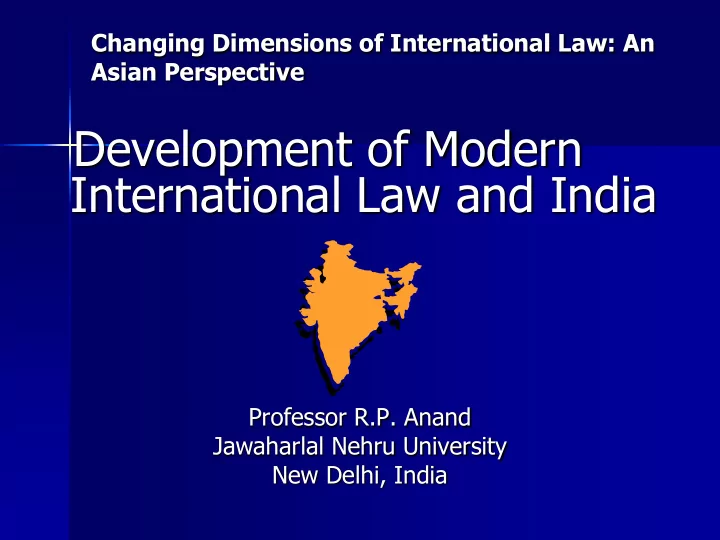

Changing Dimensions of International Law: An Asian Perspective Development of Modern International Law and India Professor R.P. Anand Jawaharlal Nehru University New Delhi, India
International Law in Ancient Socities International Law in Ancient India Kautilya’s Arthasastra and Manusmriti Fabled Land of India
Search for a Maritime Route to India Europeans need to reach India: Fights against Muslims and Demand for Spices, especially Pepper Role of Portugal and Spain Portuguese Arrive in India in 1498
Jealousy against Portugal Portugal’s attempt to keep sea route to India a secret. Other Europeans enter the fray. India a Divided Subcontinent Rules of Inter-state conduct in India when the Europeans Arrived.
Struggle for Dominance in India India disintegrated after the death of Aurangzeb, the Great Mughal Emperor in 1812. European and Indian struggles for dominance. England and France started interfering in local disputes. England defeated the French and most of the local rulers and became a supreme power by 1818. India becomes a British Colony in 1857.
Exploitation of Indian Resources England becomes super-power. Other Europeans acquire colonies in Asia European struggles and conflicts.
Development of Modern International law Modern international law started developing after the defeat of Napolean and the Congress of Vienna. International Law of Europe applicable only to European countries. Family of Civilized States.
Two World Wars European struggles lead to two devastating World Wars. Attempts to establish International Organizations. India becomes member of the League of Nations.
Establishment of the United Nations India becomes independent in 1947. As a parting gift India was divided into two countries. Populations migrated. Tremendous loss of life. Even more difficult was the problem of six hundred and odd Princely states which after the lapse of British suzerainty, became independent. But India and Pakistan insisted that they had to join one of the two countries. India solved the problem except for Hyderabad and Kashmir. While in Hyderabad India used minimal force, Kashmir problem still lingers on
India in the United Natios India joins as an original member of the United Nations. India condemns Colonialism and Racialism. India plays an active role in the independence of Indonesia. Called two international conferences for the purpose. India helps admission of new states to become members of the UN by requesting the Russians not to use veto.
India in the United Nations Liberation of Goa India decries Racialism. India accepts International Law Principles of Peaceful Coexistence or Panchsheel.
India and the United Nations India supports the United Nations. India supports Communist China’s Recognition India acts as a bridge between two Blocs.
Development of International Law India and the Group of 77 India supports development and modification, and codification of international Law. A New common law of mankind in slowly emerging.
Recommend
More recommend